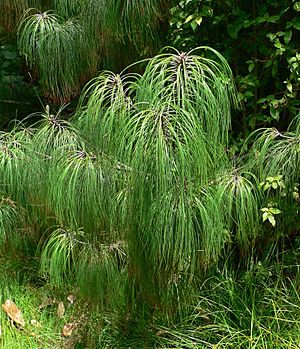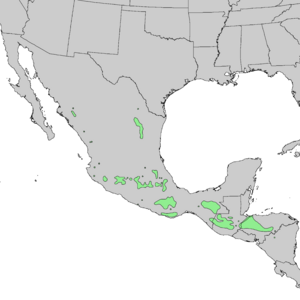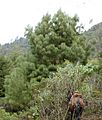Pinus pseudostrobus facts for kids
Quick facts for kids Pinus pseudostrobus |
|
|---|---|
 |
|
| var. apulcensis in cultivation | |
| Conservation status | |
| Scientific classification | |
| Genus: |
Pinus
|
| Species: |
pseudostrobus
|
 |
|
| Natural range of Pinus pseudostrobus. Pinus pseudostrobus is also found in El Salvador. | |
| Synonyms | |
|
Pinus angulata Roezl Pinus alpucensis Lindl. Pinus astecaensis Roezl ex Gordon Pinus coatepecensis (Martínez)Gaussen Pinus estevezii (Martínez) J.P.Perry Pinus heteromorpha Roezl Pinus nubicola J.P.Perry Pinus oaxana Mirov Pinus orizabae Gordon Pinus prasina Roezl Pinus protuberans Roezl Pinus regeliana Roezl Pinus yecorensis Debreczy & I.Ràcz |
|
Pinus pseudostrobus, known in English as the smooth-bark Mexican pine and in Spanish as chamite or pacingo, is a tree found in forests of Mexico and Central America. It is 8 to 25 m tall with a dense and round top.It is threatened by logging and wood harvesting. The bark is brown and fissured and smooth when young. It is subject to ex-situ conservation. It grows at altitudes between 850 and 3250 m. from 26° to 15° north latitude, from Sinaloa, Mexico to Nicaragua and Honduras. It occurs within a rainfall regime that rains mostly in summer.
A stand of about 15 fully mature smooth-bark Mexican pines is in Imperial County, California, at the Palo Verde County Park, in a narrow strip of land between Hwy 78 and the Colorado River.
English botanist John Lindley described the species in 1839. It is divided into Pinus pseudostrobus var.apulcensis (Lindl.)Shaw (Apulco pine), Pinus pseudostrobus f.protuberans Martínez and Pinus pseudostrobus var.pseudostrobus.
It has been introduced in New Zealand near sea level and has done well.
-
Male cones at San Francisco Botanical Garden
See also
 In Spanish: Pino lacio para niños
In Spanish: Pino lacio para niños




